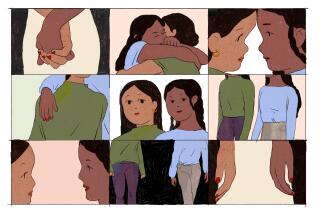Farther From Africa Than From Home : THE LION AND THE JACKAL<i> by W.T. Tyler (Linden Press / Simon & Schuster: $18.95; 470 pp.) </i>
- Share via
Set in the fictional country of Jubba on the Horn of Africa, “The Lion and the Jackal” is an intelligent novel of politics and folly. In the background, a war is brewing which closely resembles the Ethiopia-Somalia conflict in the late 1970s when the United States and Soviets abruptly switched alliances. In the foreground, the small American diplomatic community in Jubba moves from party to party exchanging gossip and gardening tips, with little understanding of their host country and with an almost uniform desire to leave it and move on to more prestigious posts.
Few of the American characters care about Jubba, and only one--Logan Talbot, a mid-career diplomat--understands the machinations of the Soviet-American power struggle on the Horn. It is through Talbot’s irreverent eyes that the reader views the workings of the foreign policy bureaucracy. Talbot’s is the voice in the wilderness at staff meetings where the ineffectual ambassador Lyman Harcourt allows his crazed deputy chief of mission, Bernard DeGroot, to prevail. (At times, DeGroot’s pretentions are so absurd that he becomes merely a straw man for Talbot to knock against.)
Partly because of misinformation from DeGroot and the embassy, Washington promises military assistance to Jubba, until then a Soviet satellite. On the assurance of U.S. aid--which Talbot alone realizes Washington never intends to send--Jubba invades its neighbor Ethiopia, also supplied by the Soviets. A pawn in the superpowers’ game, Jubba pursues its dream of recovering lost grazing land and plays out a fate as inevitable as the fate of the wounded lion pursued by the jackal across the plain.
The border war acts as a theoretical construct for the novel rather than the book’s chief concern. The war’s consequence to the people of Jubba is far less realized than the consequence to the social life of the diplomatic community. It is the small dreams of empire cherished by the Americans which are the grist of “The Lion and the Jackal”: Julia Harcourt’s desire for her husband to land a more prestigious post in a more au courant capital; her husband’s desire for the same so that his wife might be happy and allow him to retire and paint; DeGroot’s desire to run the embassy; Talbot’s hope to make a career leap when he takes his next post in Paris.
Like Jubba, the characters are “living in the future,” dreaming of what might be and therefore isolated from their own present and from each other. As players in the foreign policy bureaucracy, each is a “passenger in a closed train, passing over an unfamiliar track and pulled along by engines he hadn’t stoked, didn’t understand, and over which he had no control.”
W. T. Tyler, a pseudonym of a former foreign service officer, knows the territory of the “cocktail party diplomat.” He is merciless in some of his portraits: the devouring selfishness of Julia, the hypocrisy of DeGroot, the ineptitude of Harcourt. He presents some wonderfully funny scenes: Harcourt testing a yachting slicker sent from Connecticut by having his houseboy spray him with a garden hose.
Tyler’s fifth novel, “The Lion and the Jackal” exposes an American diplomatic corps as isolated from the country in which they serve as they are from the decision-making processes of foreign policy. They have few Jubba friends and no connection with the life of the people in the country. At one point, Talbot muses, “I was thinking I’ve never been in a Jubba house.”
The Africans in “The Lion and the Jackal” are primarily servants--houseboys, drivers, cooks--and a few state officials. The novel does consider the life of one Jubba general and his lieutenant fighting on the border; however, this story alternates briefly with the main story and is never fully integrated.
Talbot himself makes one or two forays into local culture, but primarily he too stays within the confines of the European community. Within that community, he does begin to come of age and make a commitment to another individual, a commitment which relieves him of the burden of his isolation. His growth at the end happens rather abruptly, however, as does his change of heart toward DeGroot and others.
Also abrupt is the falling away of the scales before Harcourt’s eyes, allowing him to see the absurdity of DeGroot. Yet even though the characters’ final transitions are somewhat jerky and the conclusion not entirely satisfying, the journey toward the end is rich in intelligent, political thought and strong writing.
More to Read
Sign up for our Book Club newsletter
Get the latest news, events and more from the Los Angeles Times Book Club, and help us get L.A. reading and talking.
You may occasionally receive promotional content from the Los Angeles Times.









